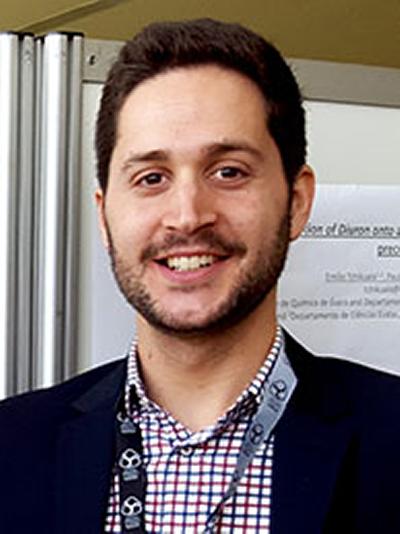
Alex Black, PhD student in Electrochemistry, University of Southampton
Alex achieved his undergraduate degree in Chemistry MChem at the University of Leicester. In his fourth year he worked for Professor Andrew Abbott where he looked at dissolution and recovery of p-block metals in Deep Eutectic Solvents. He began his PhD at Southampton in 2017, working for Professor Philip Bartlett. His studies include the electrodeposition of bismuth telluride nanowires from supercritical fluids for thermoelectric devices.

Katarina Cicvarić, PhD student in Nanoelectronics, University of Southampton
Katarina was born in Zagreb, Croatia. She graduated from Faculty of Chemical Engineering and Technology, University of Zagreb with M.Sc. degree in Applied chemistry, module Advanced Materials and Technologies. Her master thesis was research on chemical and biochemical sensors with wireless radio communication technologies. In June 2017, she joined ADEPT programme by enrolling postgraduate doctoral course at Nano research group, Electronics and computer science. In this research project, she will use cleanroom Facilities of the Southampton Nanofabrication Centre as starting point for the fabrication, in-situ characterisation, and measurements of electronic properties of nanoscale thermo-electric materials.

Jorge Diniz, PhD student in Chemistry, University of Nottingham
Jorge Diniz graduated with a M.Sc. in Chemistry from University of Lisbon in 2016. He moved to the University of Nottingham in 2017 as an ERASMUS+ research trainee and has continued in Nottingham in order to start a Ph.D. in confined phase behaviour, under the supervision of Professor Mike George.

Jeffrey Ede, PhD student in Physics, University of Warwick
Jeffrey graduated with a Master’s in Physics from the University of Warwick in 2017. He has recently begun a PhD in electron microscopy under the supervision of Richard Beanland. His research will be mainly computational, and will involve using a combination of GPU-accelerated computer vision, machine learning and automation to extract new information from electron micrographs. Some of the programs being developed will be applied to the electrochemistry of phase change memory elements and thermoelectric nanowires as part of the ADEPT Programme.

Rhys King, PhD student in Chemistry, University of Southampton
Rhys is working in Gill Reid’s lab, with a research focus on main group inorganic synthesis. Before joining the ADEPT programme, he received his MChem from the University of Oxford. During his Part II project he worked in the lab of Professor Philip Mountford at Oxford University, developing organic ion-paired catalysts for the ring opening polymerisation of rac-lactide to make PLA, a sustainable biodegradable polymer. As part of the ADEPT project he will be working on precursor development for electrodeposition.

Gilles Moehl, PhD student in Chemistry, University of Southampton
Gilles began studying at the University of Heidelberg, Germany in 2012 and graduated with a Physics degree in 2015. During his Bachelor’s thesis, he worked on optimising plasma etching processes for the fabrication of metallic magneto-calorimeters (MMC). He undertook a Masters in condensed matter physics at the Technical University of Munich, Germany, and worked on lithium-ion polymer batteries which were characterized using in-operando small angle X-ray and neutron scattering. In Southampton, Gilles will be exploring the nucleation of bismuth telluride during electrodeposition, using grazing incidence small angle scattering.

Daniel Newbrook, PhD student in Nanoelectronics, University of Southampton
Daniel completed an undergraduate degree in electronic engineering at the University of Southampton, and is continuing his studies at Southampton with a PhD in electronics as part of the ADEPT group. His research focuses on simulation of thermoelectric devices using finite element methods, incorporating quantum transport models; and characterisation of thermoelectric devices, in particular the thermal conductivities in these devices when scaled down to nanometre lengths using the ω-3ω method.

Li Shao, PhD student in Chemistry, University of Southampton
Sherry obtained a master’s degree in chemistry engineering from Fuzhou University, China, where her research focused on electrocatalysis for water splitting and counter electrodes of dye-sensitized solar cells. She has experience in synthesizing inorganic materials, including synthesis of Ni-Co-Se alloy hollow microspheres as the counter electrodes for DSSCs. During her Ph.D. Li Shao will be working on templated electrodeposition of nanoscale semiconductors, which offer a novel route to the fabrication of high performance thin film thermoelectric devices.